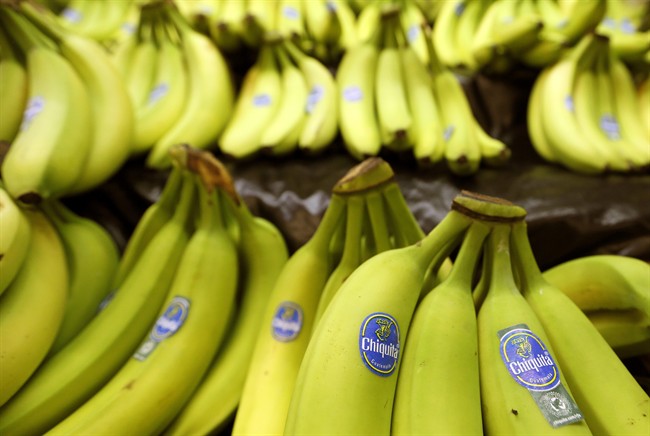TORONTO – It’s lunchtime and you’re feeling the hunger pangs. Instead of diving into a chicken salad, could you satiate your appetite with a big bowl of cherries?

Monomeals – which is when diners have a meal comprised of a single ingredient, typically fruit – is the latest frontier in diet trends. Unlike complicated cleanses or a laundry list of forbidden foods, monomeals are meant to be simple for planning and for digesting.
“It’s making a meal out of one food and it’s usually most often fruit,” according to Carla Golden, a South Carolina-based nutritionist.
READ MORE: What Health Canada’s ‘easier to read’ nutrition labels look like
Typically, monomeals are eaten raw so they retain their nutrition, and for breakfast or lunch, Golden says. Think of a bundle of bananas, four apples or an entire watermelon as prime examples.
You can create a monomeal out of a single vegetable but it’d be tricky because they’re much lower in calories so they’d, in turn, provide less fuel for your body. It’d take a lot of romaine lettuce, cucumbers or green beans to fill you up for the rest of the day.
“Fruit is packed with calories, along with minerals, vitamins and hydrating water. The natural sugar content means immediate fuel for our cells. It’s perfectly acceptable to eat just a cantaloupe or peaches. There are no rules of what a meal should be,” Golden said.
READ MORE: Atkins to South Beach – diets garner similar results, Canadian study suggests
On social media, diners are sharing their #monomeals far and wide.
https://twitter.com/CaitlinPerry7/status/512297769554677760 https://twitter.com/OrganicSnob/status/488398500845989889
Weighing the pros and cons
Nutritionists are divided when it comes to monomeals, though. Golden suggests they’re beneficial to your body because your digestive system can focus on breaking down a single food properly.
Your body turns to various enzymes that break down protein, carbohydrates and fat. She suggests that too many ingredients can be taxing on the body. That’s how you end up with heartburn, an upset stomach or lethargy, Golden says.
Monomeals are also easy to follow – you aren’t counting calories, there are no forbidden foods and portion control isn’t as much of a concern when you’re feasting on fruit.
But Kate Comeau, a dietitian and spokesperson for the Dietitians of Canada, isn’t sold.
READ MORE: Do fad diets followed by celebrities work?
“There seems to be a belief that eating a mixed meal is overly taxing on the body. Interestingly, eating a monomeal with large quantities of fruit could also be considered taxing considering the insulin response that would be required to keep blood sugar levels constant,” Comeau told Global News.
Fruit is a source of quickly absorbed sugar – it’s slower than, say, eating a handful of jellybeans or sipping on juice because of the fibre but it’d still tamper with insulin levels, she warned.
While a Thanksgiving turkey dinner or a late-night poutine would be taxing on your digestive system, a well-balanced “mixed meal” of homemade lentil carrot soup topped with pine nuts wouldn’t stress digestion at all, she said.
READ MORE: 6 misconceptions about nutrition and healthy eating
Monomeals based off of a single fruit would also lack in protein and fat. Golden says that up to eight per cent of calories in fruit come from protein, while protein is in about 20 per cent of vegetables.
Comeau says that adding healthy fat to vegetables increases absorption of fat soluble vitamins. That’s fat coming from olive oil, seeds or nuts – they’re not found in raw fruits and vegetables.
“Eating a piece fruit with a cube of cheese, plain yogurt or a few nuts can help to slow down the absorption of sugar, keeping you fuller for longer,” she suggested.
Golden says that monomeals aren’t meant to be eaten for all three of your daily meals. Instead, they’re meant to be a convenient, healthy and satisfying breakfast or lunch.
READ MORE: The 41 most nutrient-dense fruits and vegetables
By dinner, she suggests eating a heavier meal. “Fruit is so easy to do for breakfast and lunch. By dinner, we’re more tired and we might want something to ground us and get us ready for sleep,” she said.
carmen.chai@globalnews.ca



Comments